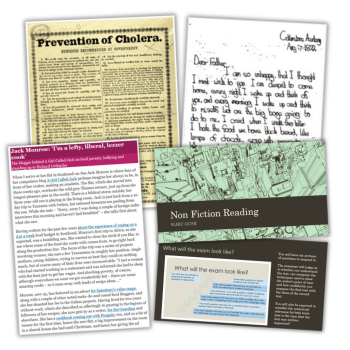60-page Word doc and 80-slide PowerPoint
KS4
Years 10-11
This non fiction texts GCSE English pack contains a selection of 19th- and 21st-century non-fiction articles. There’s also a PowerPoint to use in the lesson, containing thematic starters and plenaries.
Non fiction texts for GCSE English – themes
- Captivity – including a description of a slave auction in America in 1859
- Exploration and travel – including the last journals of David Livingstone in Central Africa
- Healthcare – including an account of Florence Nightingale’s experiences in a hospital during the Crimean War
- Education and child labour – including an extract from a parliamentary speech given by Lord Ashley (1768-1851)
- Mental health – including a recount of a visit to an American lunatic asylum
- Gender – including an article about suffragette, Emily Wilding Davison
- Death and mortality – including an article about a man who was delivered alive to anatomists
- Domesticity – including an article about the role and responsibilities of a housekeeper
- Anti-social behaviour – including an 1898 about ‘young ruffians’ terrorising the streets of Lambeth
- Places – including a Bill Bryson interview about London
Where to begin with non fiction
- What are the main ideas, themes or characters that are being introduced or developed?
- How does the writer’s point of view come across (for/against, positively/negatively)?
- How do particular choices of words/phrases/lines within the extract affect the reader?
- How do the articles show the similarities and differences across time?
- Why is the writer seeking to have this effect?
- What other parts, or key pivotal moments of the text does it suggest? What do you imagine the rest of the text to include or explore?
- When I read this, what do I think is important? How does it add to, reinforce or change how I think about the topic, themes or ideas that I have been studying?
Kat Howard is an English teacher and founder of LitDrive.org.uk (@LitdriveUK) which helps English teachers connect and share resources. Check out her blog at saysmiss.wordpress.com and follow her on Twitter at @saysmiss.











